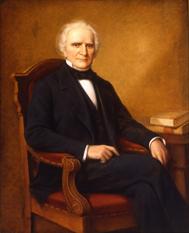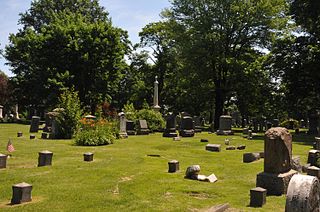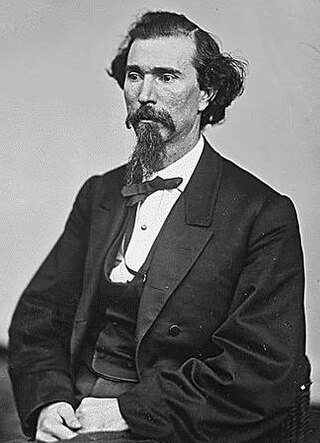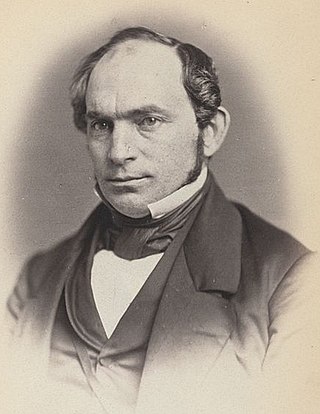
The 15th United States Congress was a meeting of the legislative branch of the United States federal government, consisting of the United States Senate and the United States House of Representatives. It met in the Old Brick Capitol in Washington, D.C. from March 4, 1817, to March 4, 1819, during the first two years of James Monroe's presidency. The apportionment of seats in the House of Representatives was based on the 1810 United States census. Both chambers had a Democratic-Republican majority.

Samuel Delucenna Ingham was a state legislator, judge, U.S. Representative and served as U.S. Treasury Secretary under President Andrew Jackson.

George Washington Campbell was an American statesman who served as a U.S. Representative, Senator, Tennessee Supreme Court Justice, U.S. Ambassador to Russia and the 5th United States Secretary of the Treasury from February to October 1814.
The 1818–19 United States House of Representatives elections were held on various dates in various states between April 26, 1818 and August 12, 1819. Each state set its own date for its elections to the House of Representatives before the first session of the 16th United States Congress convened on December 6, 1819. They occurred during President James Monroe's first term. Also, newly admitted Alabama elected its first representatives in September 1819, increasing the size of the House to 186 seats.

The 1812–13 United States House of Representatives elections were held on various dates in various states between August 3, 1812, and April 30, 1813. Each state set its own date for its elections to the House of Representatives before the first session of the 13th United States Congress convened on May 24, 1813. They coincided with James Madison being re-elected president.

Evergreen Cemetery and Crematory is a cemetery and crematorium located at 1137 North Broad Street, Hillside, Union County, New Jersey. Parts of it are in Hillside, Elizabeth, and Newark.

Philip Johnson was an American lawyer and politician who served three terms as a Democratic member of the U.S. House of Representatives from Pennsylvania from 1861 to 1867.

John Brisbin was an American politician, lawyer, and educator who briefly served in the United States House of Representatives in 1851, representing the 11th congressional district of Pennsylvania as a Democrat in the 31st United States Congress.

Charles St. John was a representative in the US House of Representatives from New York.
Ezra Baker was an American politician and physician who served a single term in the United States House of Representatives, representing the at-large congressional district of New Jersey from 1815 to 1817 as a member of the Democratic-Republican Party.
Samuel Fowler was an American Democratic Party politician who represented New Jersey's 4th congressional district in the U.S. representative for two terms from 1889 to 1893.

Jacob Reynier Wortendyke was an American Democratic Party politician who represented New Jersey's 5th congressional district in the United States House of Representatives from 1857 to 1859.
John Bancker Aycrigg was an American physician and politician who represented New Jersey in the United States House of Representatives in two non-consecutive terms from 1837 to 1839 and 1841 to 1843.
Massachusetts elected its members November 2, 1818. Massachusetts's electoral law required a majority for election, necessitating additional elections in five districts on April 5, 1819, and July 26, 1819.

On January 1, 1818, a special election was held in North Carolina's 7th district to fill a vacancy left by the death of Representative-elect Alexander McMillan (F) before the 15th Congress had assembled.

Illinois elected its new member sometime in 1818, after gaining statehood.
A special election was held in Massachusetts's 20th congressional district on March 16, 1818 to fill a vacancy left by the resignation of Albion K. Parris (DR) on February 3, 1818 after being named a judge of the United States District Court for the District of Maine.

Virginia elected its members in April 1819, after the new congress began but before the first session convened.

John Condit (Democratic-Republican) of New Jersey's at-large congressional district resigned to become assistant collector of the Port of New York.

The Boudinot–Southard Farmstead is located at 135 North Maple Avenue in Bernards Township of Somerset County, New Jersey. The property was purchased by Elias Boudinot in 1771. Featuring a Colonial Revival farmhouse, it was added to the National Register of Historic Places on December 18, 2009, for its significance in agriculture, architecture, military and politics/government. The 37-acre (15 ha) farmstead includes four contributing buildings and two contributing structures. It is also known as the Ross Farm.














